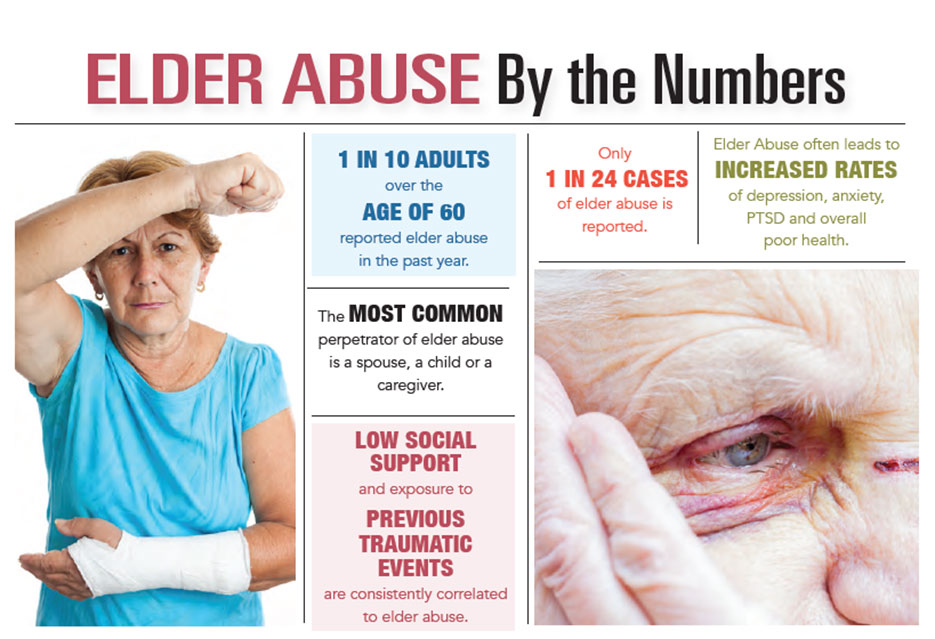Dr. Melba Hernandez-Tejada and her team at the Elder Abuse Assessment Training and Mental Health Services Program of the College of Nursing at the Medical University of South Carolina have conducted research on elder abuse for more than a decade. Their groundbreaking research on national and state levels has been funded by grants from the Department of Justice and the South Carolina Office of the Attorney General. These studies were designed to not only define the problem and examine the frequency and types of abuse taking place but also to develop solutions to reduce the frequency of cases while developing innovative ways to attend to the needs of those who have been victimized.
The National Elder Mistreatment Study, the largest and most comprehensive study ever conducted, evaluated the prevalence of elder abuse and neglect in the United States. It helped the team examine and understand the risk factors and the characteristics common to those incidents of mistreatment. It also brought into sharp focus the steps the team could take to help those individuals in need.
Elder abuse is defined as an intentional act that is perpetrated by a caregiver or trusted individual that may lead to harm of someone age 60 or older. The types of abuse might include physical, psychological, sexual or financial – or they might come in the form of abandonment or neglect. The research indicated that 10 percent of adults living in the community over the age of 60 had experienced abuse of some kind.
“Emotional abuse is one of the most common forms of abuse against older adults, and while it does not leave a physical mark, it leaves an invisible wound,” Dr. Hernandez-Tejada explained.
This type of abuse often leads to increased rates of depression, anxiety, post-traumatic stress and poor overall health.
The team has also created a model of how communities can provide programs that will keep senior citizens active and engaged in the community as a way to improve their quality of life and reduce the frequency of elder abuse.
According to Dr. Hernandez-Tejada, “There is value when we translate research into practice, and this value is increased when we connect with our community.”
The Elder Abuse Training and Treatment Program also offers training for health care providers, victim service providers and other professionals and organizations serving older adults on how to identify and refer cases of potential elder abuse and neglect. The goal of the training is two-fold – to increase the number of people in the community who can identify elder abuse and to protect and care for the elderly population.
Mara Steedley, the training coordinator for the program at MUSC, added, “We have trained nearly 1,000 members in the tri-county area. As we continue to build connections in the community, we will increase awareness and enhance victims’ mental health options by providing telehealth counseling at no cost to the victim.”
The team is addressing some of the most common problems that impede patients from connecting with services, such as lack of transportation, geographic distance from providers or being home- or bed-bound due to physical illness. They want to explore offering telehealth using iPads through secure HIPAA compliant programs as an innovative mode of delivery for mental health services to these patients.
Steedley added, “We want people to understand that we have adopted a patient-centered approach and that services are available to them even though they physically cannot be present in a provider’s office. Combining that with health care providers who are trained to be more aware of elder abuse and are able to perform safety screening in addition to telehealth outreach services increases patient connection and provides a network of support and care to them.”
Another key component of the program’s awareness campaign is its involvement in the World Elder Abuse Awareness Day on June 15.
“We are hosting several events throughout the week to engage the aging population and community partners that encourage social support, which is one of the most modifiable and effective factors in preventing elder abuse,” Steedley said. “Social support can be a protective factor since one of the major findings in case studies is that low social support was the most consistent correlated factor with abuse, and it represents an area toward which preventive intervention may be directed with significant public health implications.”
If you suspect a case of elder abuse, contact Adult Protective Services in your county: Charleston County: 843-953- 9400; Berkeley County: 843-761-8044; and Dorchester County: 843-563-9524.
By Rich O’Brien








